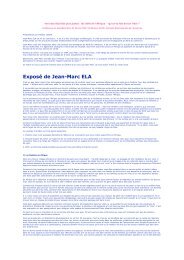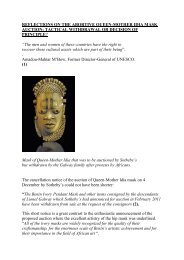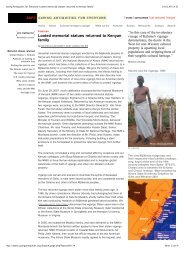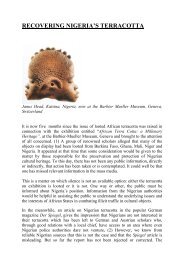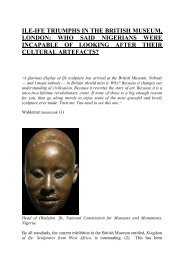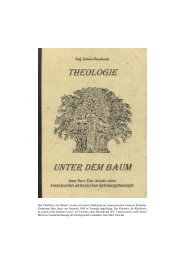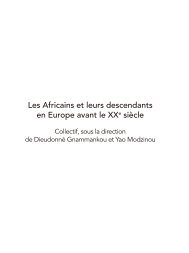this background, I argue that whiteness behaves structurally the same way. While the economicpower is clearly visible and simultaneously reason for pride and justification for superiority, playinga dominant role in post-colonial global politics is hardly admitted by white governments. On theideological level, white power simply disappears. In particular, links between the economical orpolitical sphere and the ideological one are silenced or strictly denied (e.g. racism as instrument forexploitation).Barthes discusses that the power of the bourgeois social class is made invisible. I argue thatwhiteness can be seen analogue. Both names disappear. The dominant culture leaves no space foranother morality, another art or another culture. Ideologically, so Barthes, all other groups or classesin society have to borrow from the dominant class. This allows the dominant ideology to make itselfappear as universal. Barthes continues that it “can therefore spread over everything and in so doinglose its name without risk: no one here will throw this name of bourgeois [or white] back at it”(139). I would argue that the erasing of the name whiteness achieved, as a result, that it is harder todenominate actors and to allocate responsibilities. One example of this phenomenon is that racismis usually not discussed as a specific white problem, but in the context of universal xenophobia.Another example would be that white people are not accused for institutional racism as they are notconsidered responsible for the (natural) system. Following Barthes, the anonymity of power playsan important role in the (inter)national “unwritten norms of interrelationship” (140). <strong>White</strong>ness isthereby able to peacefully live neutralised without attracting attention from intellectuals orresistance from oppositionals.Barthes argues that “the further the bourgeois class propagates its representations, the morenaturalized they become. [...] It is therefore by penetrating the intermediate classes that thebourgeois ideology can most surely lose its name” (140). Hence, examining representations throughwhich whiteness manifests itself is extremely important as this process of trying to get rid of itsname is the central process of the dominant class in transforming (historic) reality into a (natural)image.3. de-politisationBarthes' conclusion that myth has primarily de-politicising qualities is an extremely importantcognition for the analysis of whiteness. With the de-historicised, racialised, inferior, black subjectas signification, the myth of white superiority simply states facts instead of giving genealogies.Barthes explains: “In passing from history to nature, myth acts economically: it abolishes thecomplexity of human acts, it gives them the simplicity of essences, it does away with all thedialectics, with any going back beyond what is immediately visible, it organizes a world which iswithout contradictions because it has no depth, [...] things appear to mean something in themselves”16
(143). The power of whiteness is based on the connection of visual characteristics (e.g. skin colour)with an ideological system of hierarchical classifications (e.g. racialisation). However, through theprocess of making the ideological level invisible, the message that white racial superiority is naturalremains. To reach this goal, whiteness is not only de-politicising and de-historicising, but has toessentialise to a high degree. This is achieved for example through stereotypisation.Barthes argues that only the oppressor is able to use myth to de-politicise. 35 The oppressed have nopossibility to naturalise their history through myth as they do not have the means to implement it.This means that it is not important to have access to metalanguage, what Barthes considers a precondition,but instead to have access to resources to diffuse myths through discourse. I would arguetherefore that the oppressed could have myths, just not the power to circulate them. 36 Yet, I agreewith Barthes on another difference why myth is rather utilised by the dominant group: theoppressed are not aiming at an eternalisation of the as-is-state, but rather have an interest in itstransformation. <strong>White</strong>ness is able to use myth, as it has an interest in portraying society andinternational order as immobile and eternalise present power relations.rhetorical formsBarthes outlined rhetorical forms, which he considered important tools of myth. Sandovalcompares them to Fanon's methodology of the oppressed and calls these forms together the “rhetoricof supremacy” 37 (Sandoval 1997: 86). A common strategy of these rhetorical figures is thetransformation of history into essences. They make the dominant subject generate and accept “amultilevel, profound alienation-in-consciousness as a natural state of being” (Sandoval 1997: 96).Their goal is the immobilisation of the world. In order to reach it, however, “they must suggest andmimic an universal order which has fixated once and for all the hierarchy of possessions” (155).Another goal of myth is that all humans should recognise themselves in images that have beenbeforehand fixed and rigidified by myth itself. <strong>White</strong>ness with its claim to universality shares thesedefined goals. As whiteness builds on a system of racialised categorisation and power relations andas it focuses on essences, Barthes' rhetorical forms can be applied to its analysis.35 His argument is based on the distinction of language object and metalanguage, as according to him the theoppressed have no access to metalanguage. As I disagree with this distinction and consider both kind of languagesas constructed, I modify the argument.36 see also Amin (1989: 104)37 Sandoval compares Barthes and Fanon and realises that they have a lot in common. She supposes that Barthes musthave known Fanon's Black Skin <strong>White</strong> Mask, since he wrote his Mythologies seven years later (Sandoval 1997: 106footnote 12). Fanon focuses more strongly on the psychological consequences of colonialism on the colonised;whereas Barthes concentrates on the strategies of the dominant colonising society. I consider Fanon highlyimportant for both the development of Postcolonial Studies and Critical <strong>White</strong>ness Studies. However, as inPostcolonial Studies, Fanon is frequently referenced and Barthes is widely unknown (Sandoval 1997: 96), andespecially as I purposely study the strategies of the dominant society, I set my focus in this work on Barthes'Mythologies. I agree with Sandoval, calling Barthes one of the masterminds of Critical <strong>White</strong>ness Studies (Sandoval1997: 96f).17



